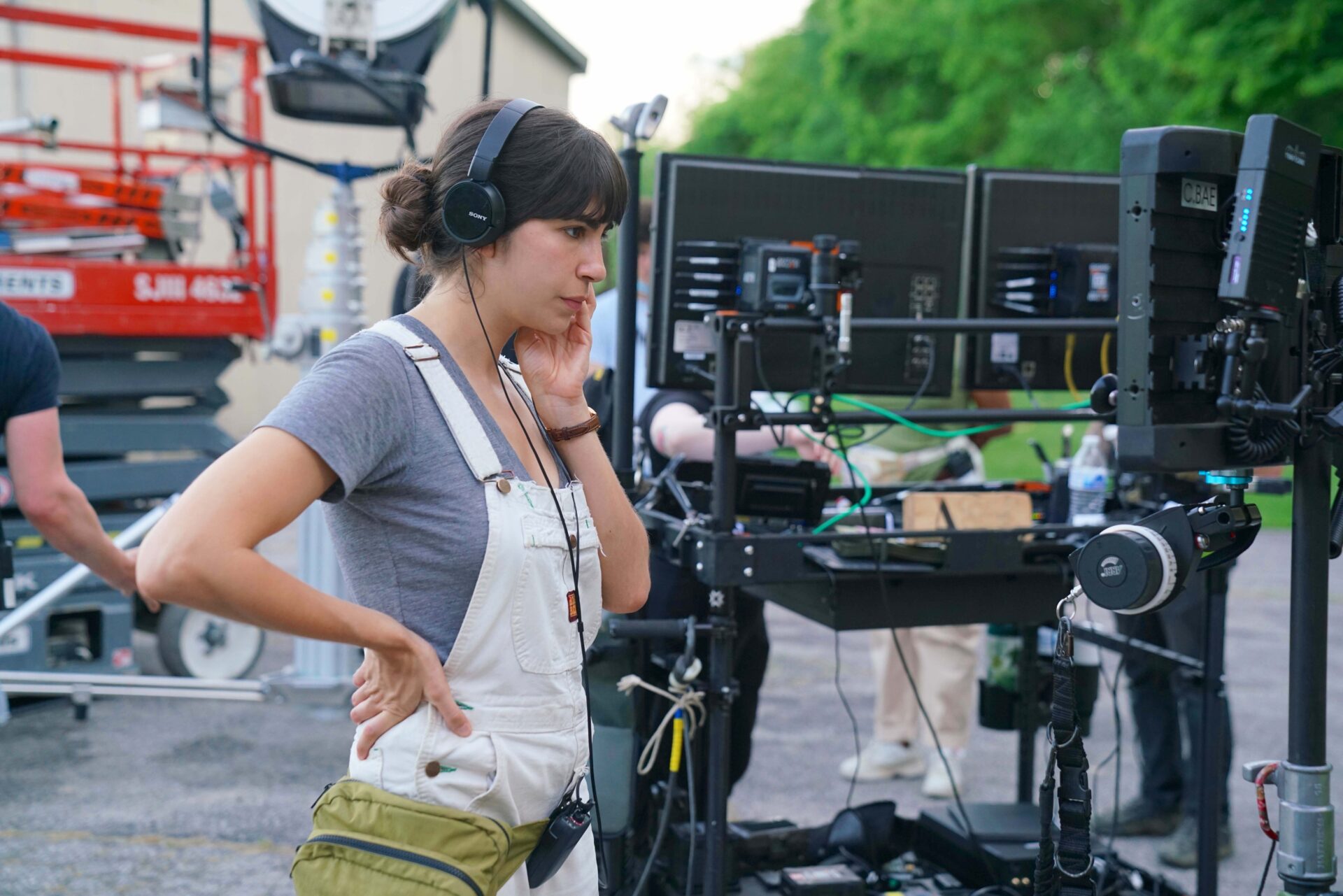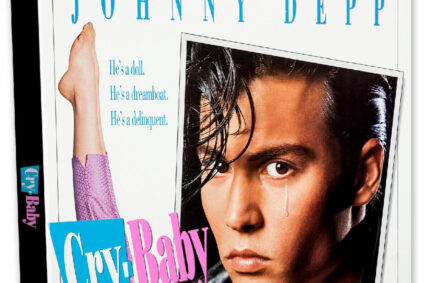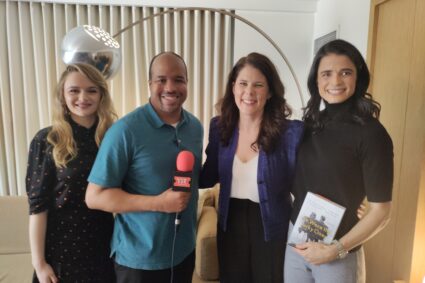
On this edition of THE INTERVUE, if there’s one type of interview I love to do is debut interviews – the actors, artists and directors who are taking their first big step into their careers and today’s guest is no exception as with her first feature film, The Starling Girl.
Seventeen-year-old Jem Starling struggles to define her place within her fundamentalist Christian community in rural Kentucky. Even her greatest joy of dancing with the church group is tempered by worry that her actions are sinful and she is caught between a burgeoning awareness of her own sexuality and her religious devotion. With the return of Owen, an enigmatic youth pastor, Jem soon finds herself attracted to his worldliness and charm. Slowly, he draws her into a dangerous relationship that could upend their entire community.
Making her directorial debut is our next guest, Laurel Parmet
Laurel, it’s great to talk to you more about this wonderful powerful film, especially since this is your feature film debut.
Thank you.
Well, my first question is why you made this film your feature film debut, since you came off two short films prior to that?
It was just something it I gravitated. I don’t know, if I could quite intellectualize it, other than it was just something in me that gravitated towards the story. I have a personal connection to it. I gravitate towards films that explore moral ambiguities. I like to challenge audiences a bit to think about how they would act in certain situations. And so, I was I was excited by the prospect.
I understand that you spent time with women from a religious fundamentalist community while working on another project. Is that correct?
I was doing research for a different project about a rodeo. And that’s how I met a group of women from a patriarchal church. And spent time with them and learned about their beliefs. My time with them was ended up being very meaningful for me, because it made me reflect on a relationship that I had when I was a teenager with an older man. It made me reflect on that relationship in ways that I hadn’t before and maybe recognize the skills that I had and how I started to question like, “Why did I have that guilt?” “Where did it come from?” “What did I learned growing up that made me feel that way?”
I decided to write this film, looking at my experiences and setting it in this world that is extreme and specific, but has a lot of similarities with my own culture. And, I shouldn’t say my own culture, it’s not like, our cultures are so different, but larger mainstream culture. Like it or not, we live in a culture that is very affected by conservative Christian thought, it affects my day-to-day life, it affects the worse. I think I wanted to seek to understand that more. And in doing so ended up you know, finding a lot of empathy and a lot of admiration for faith, and like tenets of Christianity.
Now, facts about the evolution of Jem’s dancing says such an intimate part of the character, and I was moved about how she opened herself. Through these performances, especially since the beginning of the film, I want you to talk about that gradual process of writing that sequence since we see her dancing and an increasingly gotten better it’s gotten. We got to learn more about Jen 3d stances.
So, Jem feels closest to God into herself when she’s dancing. And, she has this crisis where she’s experiencing this conflict, which is kind of the central conflict of the film, about the individual versus community expectations and in faith and devotion. She worries that if she enjoys dancing too much, then she can’t honor God. And it must be one or the other. And over the course of the film, she starts to, to realize that maybe she can have both that maybe expressing herself and enjoying dance and moving this body that God gave her is a way for her to express her faith in her and honor God. It doesn’t have to be one or the other. And that’s why I picked dance ultimately is like I thought that was a really great way to visually express that conflict. I just loved Watching dance and movies. It’s so fun. I want to put a dance scene in all my movies.
Well, we hope we can see it in the next few films. So I want to talk about the casting because we have some powerful performances among Eliza, Austin, Wrenn, Jimmi and Lewis.
Yeah, I am so proud of the performances in this film. You know, I first saw Eliza when I was writing Starling. I saw her in “Sharp Objects”, and I was just so blown away by her performance, I needed someone who could straddle lightness and darkness well, who could be innocent & naive and young seeming. Then like, has this ferocity boiling underneath, and Eliza has that tenfold and is just an incredible talent.
Then with Lewis, for Owen, I didn’t want him to be this one-dimensional predator. I wanted the audience to understand why Jem was falling for him, and maybe have the audience fall for him a little bit as well. It was this delicate dance of having the audience get wrapped up in this in the relationship in the way that Jem does, while at the same time making sure that the audience still understands that this relationship was problematic.
And so much of that was going into the casting. And so, with Owen, I didn’t want to cast this character who was like who you’d be obviously threatened by. Lewis is incredibly charismatic and gentle and has something very magnetic about him. And so, he was able to bring that side to Owen which was great.
So after you done your first film, what is the one lesson that you would take from your first film, to the next film?
If I can continue to surround myself with people who are kind, and generous and passionate, just in terms of like, in with cast and crew, just any of my collaborators. I will do that. Making films is a labor of love, and it’s stressful. It’s hard and it’s important to be surrounded by people who you trust. I had such a good time making this film. I feel like I was making this film with my friends. That’s how I want it to feel on all my films. Life’s too short. I just want to have a good time doing what I love and with people I love.
Absolutely. My last question is this. Who are your influences as a director?
Miloš Forman is a huge one. His film “Loves of a Blonde” is a huge influence on mine. Pawel Pawlikowski especially his film, “My Summer of Love” was a really big influence on scaling. I mean, this is kind of a wild card, but I love Ang Lee. His films are no matter this scale of them, no matter the scope, if they’re small, or if they’re giant epics, they’re always so emotionally true, and intimate, and honest.
I am just always so engaged in all his stories. I just watched “Crouching Tiger” the other night for like the 10th time and I still cried.
He does great films and that’s a wonderful film.
I’ve never met him. I don’t know him. But I’ve heard that he’s, you know, sort of like a little bit more of like a gentle personality a little bit more pensive and quieter and introspective, and I really, I am inspired by that. Like there’s so many ways to be a director. You don’t have to be this loud, bombastic like boss. In person, you can be whoever you are, and still be an incredible filmmaker. And so, I find that very inspiring.
Well, you are an incredible filmmaker, especially, it’s got a 90% on Rotten Tomatoes. I have a feeling this film is going to be a great success, especially when it comes out on Friday.
The Starling Girl hits theatres next Friday, May 19th


